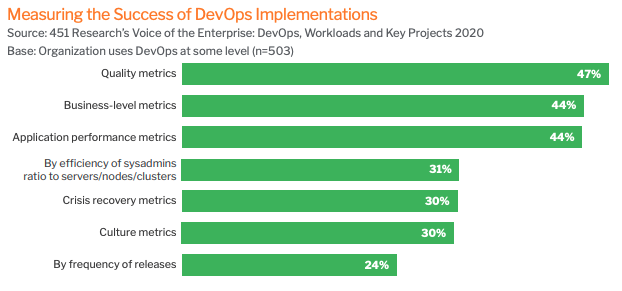Resources
Have your speed, and quality too
DevOps. Agile. CI/CD. Whatever the process of choice is within your organization, the goal is the same – speed. Development teams want to deploy code at velocity, and do it over and over again.
MEASURING THE SUCCESS OF DEVOPS
DevOps has driven faster enterprise software deployments that now include more daily and hourly releases. This is particularly evident among leading-edge enterprise companies and verticals including business services, financial services and technology. But while the initial push for speed results in faster releases, other factors begin to creep in over time – particularly quality, efficiency, predictability, security and business objectives. With DevOps maturity, these considerations start to take precedence.
While the focus is to ship code as frequently as possible, teams cannot ignore the need to also ensure code quality at the same rate. DevOps is, rightly so, more typically associated with speed, but that doesn’t mean quality has to suffer.
Leading organizations are beginning to look past just tracking release frequency and placing value on a broader set of metrics that take into account code quality. Specifically, metrics that span both technical metrics (such as Mean Time To Resolution) and business metrics (such as customer satisfaction or Net Promoter Score) are taken into account.

SOFTWARE FAILURE REPLAY
A recent Business Impact Brief from 451 Research notes that we are seeing the emergence of a new breed of solutions employed to build more reliable software. These Software Failure Replay (SFR) platforms take a zero-tolerance approach to software failures.
According to 451 Research; “Volume testing is key, but keeping on top of those tests and ‘keeping them green’ has to be a priority.”
Unlike traditional, manual debugging which is based on guesswork, Software Failure Replay provides data-driven insights into what software did before it failed.
By recording a failed process down to instruction level, they get a 100% reproducible test case. This makes bug fixing predictable. SFR can also capture intermittent failures which cannot be tracked down in any other way.
451 Research recommends embedding new and emerging technologies, such as SFR, as early in the process as possible. This ensures that code quality is being tracked, and protected, as early in the development lifecycle as possible.
CONCLUSION
Building in the flexibility to quickly respond to changes must be a priority for any development team. But this has to be done while maintaining the full benefits of DevOps: finding and addressing bugs more quickly, improving software quality, and of course reducing the time it takes to validate and release new software updates.

